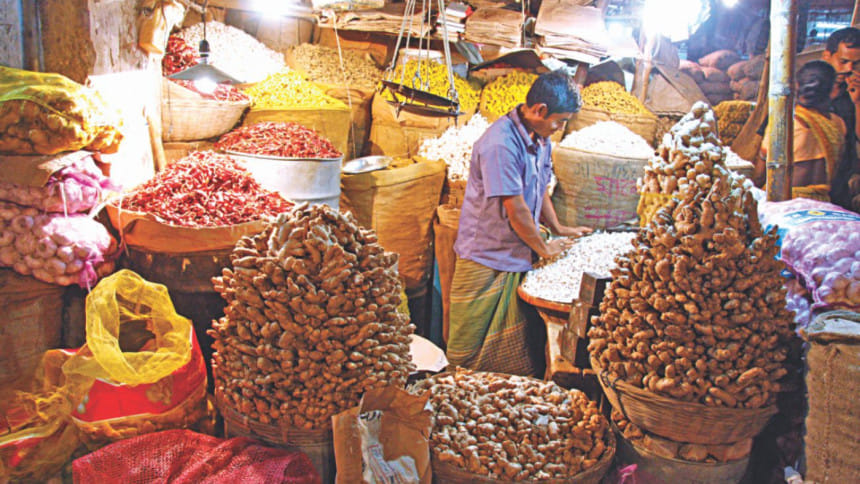Market manipulation to blame for spiralling commodity prices

The recent price surge in kitchen commodities has created uproar in the masses. The backdrop of this bitter outrage amongst our disconcerted population was an erratic increase in the price of onions from Tk 25 to Tk 90 per kilogramme.
The overriding presumption in the present situation has signalled towards the latent employment of market manipulation methods and tactics.
Such a premise is not devoid of facts; needless to say, in recent years, the edible oil market has phased through inflated prices and rice millers have been blacklisted and fined meagrely for deceitfully stockpiling this staple food.
This hoarding effect also propels the incumbent government onto an uneasy platform, to discharge the heavy burden of satisfying the hunger of those it governs through increased spending or slashed tariffs.
As expected, market manipulation not only damages market solidarity and integrity but has vicious consequences on the economy and the government's policies and reputation at large.

Section 25(1) of the Special Power's Act 1974 gives teeth to combat this malignant misconduct, it plainly states that -- a person found guilty of the offence of hoarding can be punished with rigorous imprisonment for a term not exceeding 14 years, life imprisonment or at the discretion of the judge, death is also a potential avenue.
Although fines are a token of legislative finesse, the gravity of these punishments alone should have been a strong deterrent. Liability for hoarding is merely attracted by- 'stocking or storing anything in excess of the maximum quantity of that thing allowed to be held in stock or storage at any one time by any person by or under any law'.
The physical proof required for the foundation of potential charges have been difficult to satisfy due to syndicated storage schemes; albeit, not wholly impossible.
However, logistically, relative blameworthiness cannot be equal throughout the supply chain. A key factor for commodities market manipulation in this scale requires the acquisition and/or control of large resources so as to squeeze the market to create and sustain an artificially engineered price, similar to the pumping and dumping methods in stocks.
For commodities, it is highly unlikely, though not improbable, that your common marketplace wholesalers or retailers would have had such a sway over the market so as to manipulate it.
Fortunately, however, if they have abetted these traders then section 25D of the same Act reserves for them a punishment of equal scale.
For those that have become sceptical of the 'slow' hands of justice, dread not. By virtue of section 32 of the aforementioned Act, the specified offence is one that is cognizable. Under section 54 of CrPC 1898, an overwhelming power has been bestowed on the police to arrest without a warrant any person concerned and involved in any cognizable offence provided a reasonable complaint has been made or credible information is received or reasonable suspicion exists.
It cannot and must not be used as a pre-emptive detention mechanism for the purpose of preventing a prejudicial act before it has been committed. By all accounts, this often misused and abused section is potentially useful here as a veiled threat to market manipulators.
In tandem with the police authorities, it is the Bangladesh Competition Commission that was instituted following the Competition Act 2012.
The said Act was promulgated with the express view of counteracting a wider market abuse regime, namely eradicating collusion in the markets and the abuse of one's dominant position by limiting the market.
A contravention of the commission's order can result in imprisonment or a fine not exceeding Tk 1 lakh for 'each day' of non-compliance.
Nonetheless, Bangladesh still requires a conjunct legal instrument for market manipulation and insider trading so as to maintain a unified great wall against the broader and principal financial market abusers.
Quite recently in 2016, the Market Abuse Regulation (Regulation 596/2014) came into force in all member states of the European Union. It aims to codify the definitions, guidelines, prohibitions and accepted market practices with respect to insider information, insider dealing, unlawful disclosure and market manipulation under the single banner of the market abuse regulation.
Bangladesh is at a critical juncture in all respects, Bangladesh Securities and Exchange Commission (BSEC) is expected to be in the process of formalising a new commodities exchange rules following the amendments in the Securities and Exchange (Amendment) Act 2012.
Notable efforts have already been initiated to establish a working exchange—Bangladesh Jute & Commodity Exchange Ltd (BDCOMEX)—but has stagnated owing to BSEC's approval.
Although an exchange is likely to facilitate a more stable price discovery for commodities, it must be regulated carefully. For the first time in 2015, The United States Commodity Futures Trading Commission (CFTC) fined and pressed charges against Arya Motazedi for front-running with non-public and confidential information, a form of insider trading, in the commodities future market for oil and gasoline.
Therefore, if and when the commodity exchange rules are formulated for a working exchange, strong emphasis on the enhanced surveillance of commodities future market, mandatory information disclosures to regulators and enforceable cash settlements should be preserved as this sector is prone to distortion and market manipulation.
The writer is a financial crime consultant at WCC22, an international firm specialising in white collar crime law. He can be reached at [email protected].

 For all latest news, follow The Daily Star's Google News channel.
For all latest news, follow The Daily Star's Google News channel. 



Comments